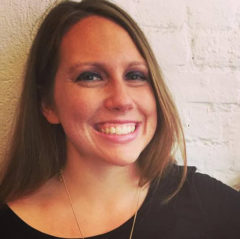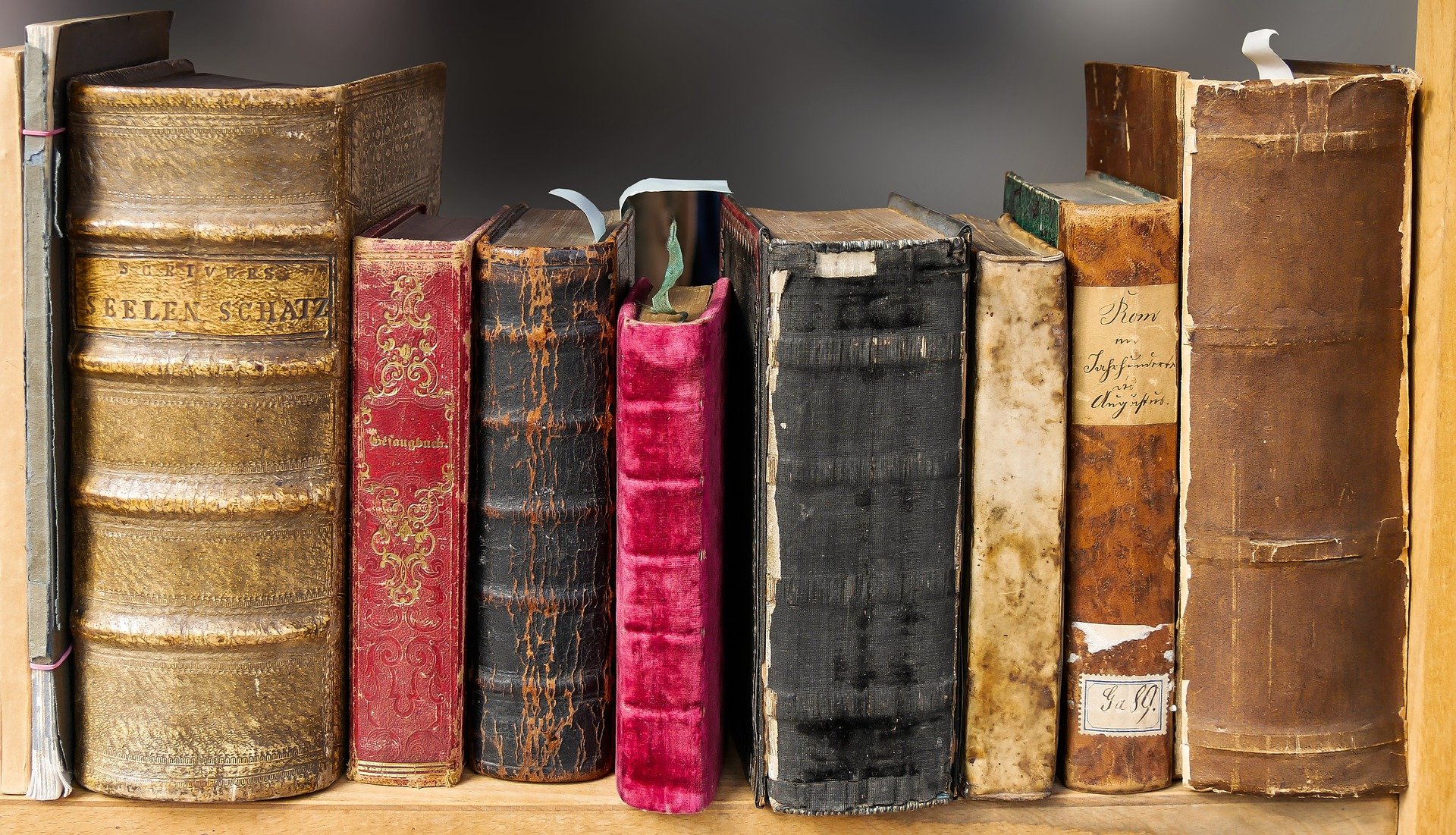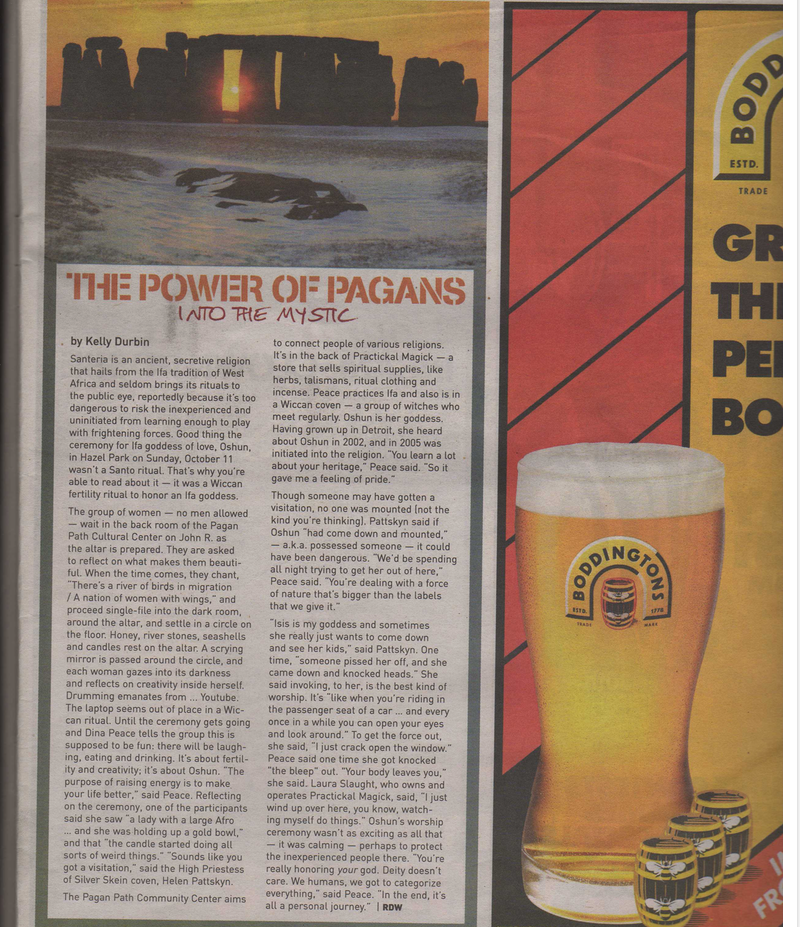This essay was published in the 2023 issue of the Bear River Review.
The Gray Lady folds over the craftsman armchair aside my pretzeled legs: printed letters, curated words. Chopped paragraphs, bolded headlines. Sorted sections (obituaries first; Book Review last). Essentially, dots on a page. But also, nostalgia. My first home-delivered Sunday New York Times in the 12 years since I stopped writing for newspapers. “Hey, here’s a fun fact,” I tell my spouse, Eric, who’s entertaining our three-year-old, William: “Since there is only one active official cemetery in Manhattan, the borough’s most popular final resting place may be Central Park—a legal site for the scattering of human ashes.”
The Velvet Underground streams from a blog, Hang the DJ by a former Detroit radio host, Christina, to our orange wireless speaker. Last time I ritually read the Sunday Times, Lou Reed would have been coming at us from her 70s/80s/90s classic alternative Sunday-morning show, Time Warp. But now, 88.7 FM, “Detroit’s Only New Rock Alternative,” no longer exists and 88.7 is the frequency of one of three (or four?) country music stations. (Which Eric says is the most reliable money-making format for radio no matter the region, he learned when studying advertising at Michigan State.) But it’s Detroit. Home of Iggy Pop, the Dirtbombs, the White Stripes. . . .
Sunday morning, brings the dawning
The alt-weekly newspaper I used to interview bands and write articles for in my twenties, Real Detroit Weekly, folded too, the only evidence of it existing on the Internet Archive’s “WayBack Machine” and a 102-word Wikipedia article: “Real Detroit was a cornerstone for local music and arts. Their collection of unique writers worked hard to keep that fact shining high.” Dang, that’s a good sentence. I wonder if one of my former editors wrote that.
You used to grab RDW for free at the front door of the coffee shop or bar such as the Woodward Avenue Brewery aka “The Wab” (also gone) to read while waiting for friends. My editor told me he enjoyed watching people flip through the pages; some even read it backwards. I stopped writing for them because they struggled paying people on time. (Now I see why.)
It’s just the wasted years so close behind
I no longer interview musicians touring through Detroit, nor do I write articles announcing the reopening of Detroit’s Russell Industrial Center as an artist colony or the Book Cadillac Hotel and its luxurious lofts, which I did in November 2008 in an article that concluded:
“According to that editorial in the Free Press, ‘You don’t walk out of the Waldorf or the Drake and see the most desparate parts of New York or Chicago. You shouldn’t have to do that in Detroit, now that the Book is reopened.’ But Detroiters shouldn’t be told their city should be more like Chicago or New York, or that the Westin Book Cadillac should be engulfed by the same surroundings as the Waldorf or the Drake. The area surrounding the Westin Book Cadillac might never be Chicago or New York, and it’s never going to be the Detroit of 1924, but there is promise there and that’s just what the city needs.”
Resurrections. Refutes to the so-called Ruin Porn that plagued the city and its global reputation back then—journalists and amateurs pouring into Detroit to document the decrepit Michigan Central Station or the Packard Plant where nature was taking the city back.
It’s all those streets you crossed, not so long ago
I now work at Wayne State University in Midtown where I’m writing a dissertation, Death Writing: Gender and Necropolitics in the Atlantic World (1660–1840), centering the first English-language magazine (the Gentleman’s Magazine, founded in 1731) and the earliest newsprint obituaries that it published. One of which, on England’s first anarchist philosopher, William Godwin (1756–1836), contains this shocking pronouncement that even after perusing hundreds of 18th- and 19th-century obits caused my jaw to drop:
“In reconsidering the character of the man whose life we have been writing, in weighing well his merits with his moral imperfections, it is melancholy to discover how far the latter preponderated, and we are led to the very painful though certain conclusion, that it might have been better for mankind had he never existed.”
What parts of people’s lives—hell, which people period—do we keep? Who and what gets buried?
“I’ve got the right to live an analog life,” a colleague said in a contentious meeting. This utterance continues to haunt me. Do I have the right to an analog life? Does anyone?
I work virtually from home finishing my dissertation and editing a literary journal. Yet I also technically have my own office on the tenth of fourteen floors in the sleek, art-deco Maccabees building, 5057 Woodward Avenue. I rarely go there, even though the lobby boasts gold and jewel-tone mosaic tiles on the ceiling and bronze elevators that transport you upwards to marble-covered hallways, which William (and I) like to run down now because, since Covid-19, the building was so desolate that no one (hopefully) heard us.
But now, when I walk down Cass Avenue, it feels like the institution—and formerly stable societal structures in general—are crumbling before my eyes. Though people are again populating the premises “post” pandemic, it feels like a dream. Like the university, universities, won’t always take this shape, fill out 19th-century structures such as Old Main, the yellow-bricked, green-roofed original WSU building with a cornerstone labeled 1894 that contains the first classroom I ever taught English in, whose clock tower illuminates red during the holidays like the Eye of Mordor. Since Covid-19, I spend more time Zooming with other eighteenth-century academics across North America, than under the watch tower.
Watch out, the world’s behind you
A few months ago I unlocked the door to my office overlooking the Italian Renaissance-style Detroit Public Library building after a quick hallway sprint with William. Someone was in there. With food, blankets, and a clear overnight bag. In theory the office was mine, but in practice, it was hers. Touching William’s little shoulder, I said, “I thought this was my office,” then she gathered her food, not her blankets, and scurried away. I haven’t returned.
I want to live an analog life—sometimes; on my terms. I want to read the Sunday Times on paper; I no longer have the tolerance to doomscroll. I want to sit on the green-leafed carpet square in the local library listening to children’s book readings with my kid, and to stop perceiving others’ children as petri dishes harboring two to four weeks of coughs and fatigue for me and mine. I don’t want to feel compelled to inhabit a non-home office if I don’t have to; I want to maximize my pre-Kindergarten years with William while also writing, teaching, working. What will be my analog-to-digital ratio when I finish my degree?
Sunday morning
I look for links to articles from my past for my CV; good thing I scanned my “clips” because otherwise it’s as though they never existed. Turns out, print’s no more stable than digital; in fact, perhaps it’s less. That’s what happens when you enter journalism in 2007, when, as one editor told me, “I guess we’ll put these articles on the website too,” when thatwebsite was an experimental compliment to the “paper.” What will I do next: write a book; get one of the assistant professor jobs I’m applying for, in Windsor, Saskatchewan, Montreal; uproot our family from the Detroit to the Saskatchewan or St. Lawrence Rivers? According to many profs, the humanities are yesterday’s news so getting a tenure-track job is like winning the lotto—if to play the lottery you require a doctorate!
But that sweet, sweet Sunday Times; still kicking it, still a sustainable business model, still reliably on my driveway when it’s still dark outside. Still emanating that acid-soft scent. No more Travel section, for which I mourn. No more Sunday Stylessection with its questionable “trend stories” conveying things some people in Brooklyn do as if they were nationwide habits, nay, human nature—dang it. But still, Sunday Opinions, Sunday World, Sunday Nation, Sunday Obituaries: Biz Markie, Hilary Mantel, Queen Elizabeth II, Sacheen Littlefeather.
I carry the paper down the basement stairs, past the former makeshift billiard room turned woodland campsite ambiance for William to play in. I drip the Sunday Times atop a clothes-drying rack that we don’t use anymore because we don’t often wear business clothes, to donate to the county shelter for homeless dogs to pee on.
Hold on. Let me print this draft real quick. I’ll write edits on the “hard copy.” Then I’ll submit it (digitally) to the (decidedly analog) Bear River Review.
—
The headers are excerpts from the Velvet Underground’s “Sunday Morning,” 1967, John Davies Cale, Lou Reed, and David Lane.




